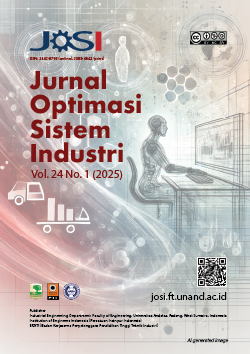Article Processing Charge Policy
2026-02-10
Effective Date: March 1, 2026
In order to maintain high publication quality, improve editorial and production processes, and ensure long‑term sustainability, Jurnal Optimasi Sistem Industri (JOSI) will begin implementing an Article Processing Charge (APC) for accepted manuscripts.
Key Points of the Policy:
- The APC applies only to manuscripts accepted for publication, starting with submissions received on March 1, 2026.
- Manuscripts submitted before this date will not incur any APC, regardless of their acceptance date.
- Details regarding the payment procedure will be provided in a separate announcement and updated on the JOSI website.
Read more


